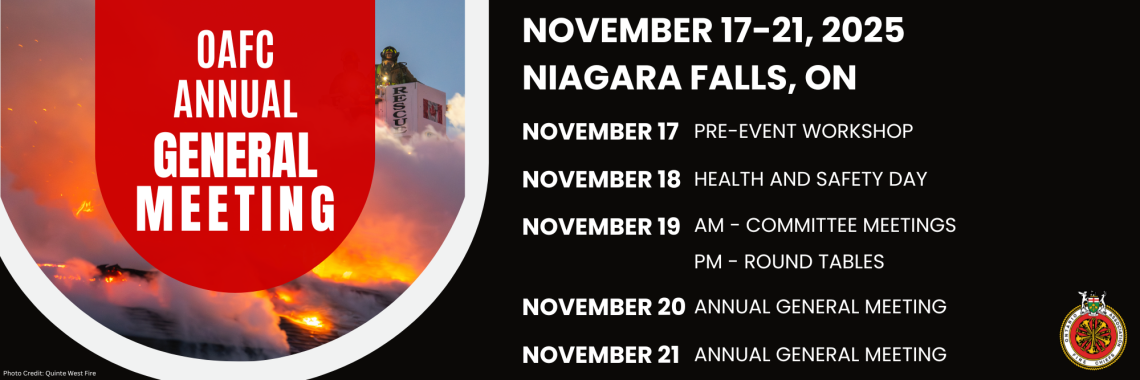Thursday - AGM Information
Thursday and Friday AGM Information
OFM Update
An update from the Office of the Fire Marshal Executive Team.
Presenters: OFM Executive Team
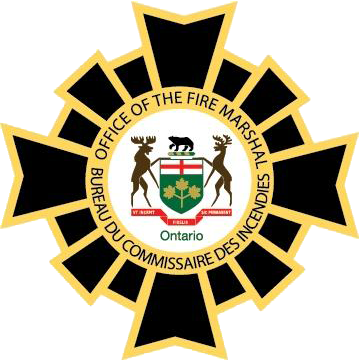
Are you Really Prepared for a Cyber Incident and the Potential Impacts?
Hear from City of Hamilton Fire Chief David Cunliffe about their Cyber Incident experience, the impact it had on their Fire Department, and lessons learned.
Presenter: Fire Chief David Cunliffe, Hamilton Fire Department
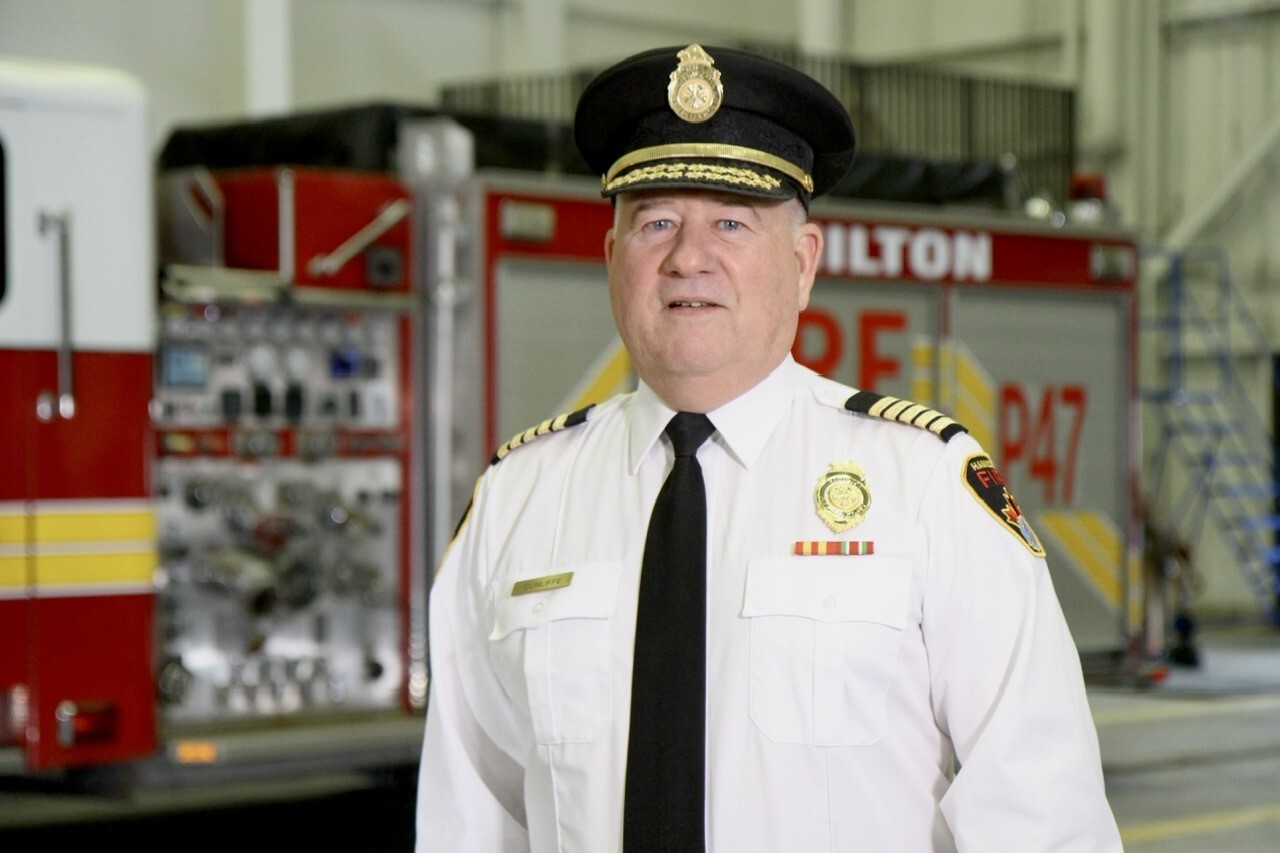 Born and raised in Hamilton, Chief Cunliffe is in his 33rd year in the Ontario Fire Service and is a third generation Hamilton Firefighter. After joining the City of Hamilton and the Hamilton Fire Department in 2005, he held the position of Divisional Chief of Training until 2007 when he was promoted to the position of Deputy Fire Chief. He held this position for nine years until 2016, when he was appointed Fire Chief. Prior to joining the Hamilton Fire Department, Chief Cunliffe served as the Deputy Fire Chief with the Town of The Blue Mountains Fire Department and Firefighter with the Town of Haldimand Fire Department.
Born and raised in Hamilton, Chief Cunliffe is in his 33rd year in the Ontario Fire Service and is a third generation Hamilton Firefighter. After joining the City of Hamilton and the Hamilton Fire Department in 2005, he held the position of Divisional Chief of Training until 2007 when he was promoted to the position of Deputy Fire Chief. He held this position for nine years until 2016, when he was appointed Fire Chief. Prior to joining the Hamilton Fire Department, Chief Cunliffe served as the Deputy Fire Chief with the Town of The Blue Mountains Fire Department and Firefighter with the Town of Haldimand Fire Department.
Chief Cunliffe is a well-respected, forward thinking leader, who brings a unique combination of business sector and fire service knowledge, skills, and experience into his role as Fire Chief. He holds a Business Administration Diploma from Mohawk College; is a graduate of the Ontario Fire College Company Officers Program; a Certified Firefighter, Certified Company Officer and a Certified Public Fire and Life Safety Educator, Trainer Facilitator, Community Emergency Management Coordinator (C.E.M.C.) and holds the Certified Management Professional Designation (CMP).
Chief Cunliffe is an active member of the International Association of Fire Chiefs, The Metro Fire Chiefs Association, The Canadian Association of Fire Chiefs, The Ontario Association of Fire Chiefs, The Ontario Large Urban Chiefs Sub Committee and the Ontario Fire Marshal Mutual Aid Advisory Committee.
Leadership in the Fire Service: Challenges and Opportunities
This session explores three fundamental leadership challenges that are common to fire departments large and small, both full-time and volunteer. Practical, actionable solutions are explored. The session also covers three opportunities to strengthen leadership capacity through strategies that are cost-effective, scalable, and proven. At the heart of this session is the emphasis on the critical role of leadership at all levels of the fire service, from the new recruit through to the Chief.
Presenter: Deputy Chief Bill Chafe, South Glengarry Fire
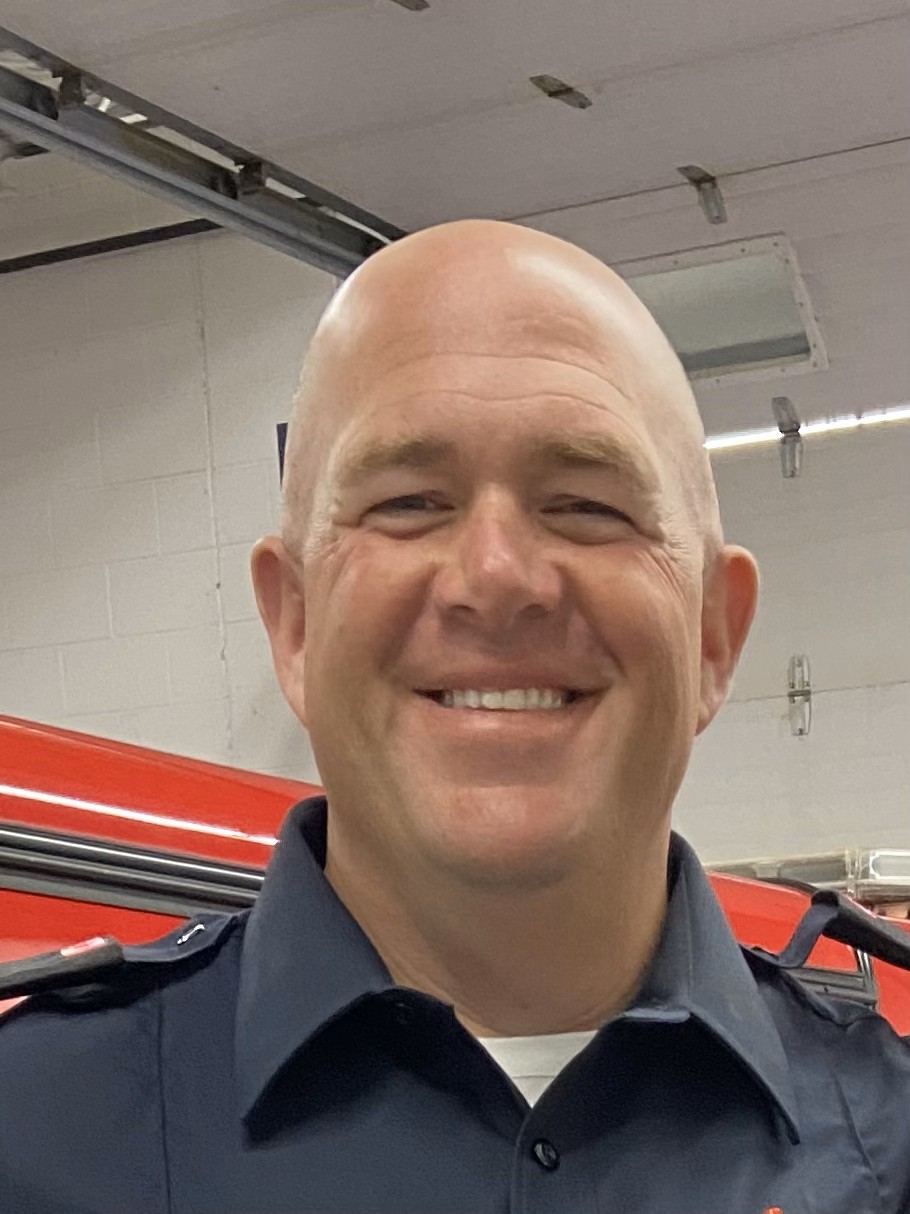 Bill Chafe is the Deputy Chief of the South Glengarry Fire Service. With over a decade of experience as a leadership training consultant across both the public and private sectors, Bill specializes in helping individuals uncover their leadership strengths, clarify their core values, and align these assets to lead with confidence and integrity. Whether working with clients or mentoring within the fire service, Bill is dedicated to building leadership capacity at every level.
Bill Chafe is the Deputy Chief of the South Glengarry Fire Service. With over a decade of experience as a leadership training consultant across both the public and private sectors, Bill specializes in helping individuals uncover their leadership strengths, clarify their core values, and align these assets to lead with confidence and integrity. Whether working with clients or mentoring within the fire service, Bill is dedicated to building leadership capacity at every level.
Keynote - Leadership inside a Firestorm
In 2023, a fast-moving wildfire, fuelled by high winds and extreme drought, devastated West Kelowna and Westbank First Nation. At the height of the crisis, tens of thousands were evacuated and hundreds of homes were destroyed. Remarkably, no lives were lost, and thousands of homes were saved. Fire Chief Jason Brolund led a team of hundreds, managing immense stress in a high stakes environment with no margin for error, in front of the whole world.
Most firefighters will go an entire career without seeing as much fire and devastation as they encountered in those intense 36 hours. Jason had built a team, not knowing when they would be called upon to perform, but knowing that it could be a life and death mission with no room for failure. They gained unparalleled lessons in leadership, forged in the face of doubt, fear of immense loss of life, injury, destruction and failure on a massive scale, in a very public way.
Emerging from the devastation, Jason recognized that his lessons learned directly related to stresses we all face. For him, the disaster proved the value of investing in relationships and providing clear communication. And when a crisis comes, the importance of leading from the front while enabling his team, showing vulnerability and building empathy and trust. While those 36 hours were gruelling, preparing for the toughest, darkest days that followed proved equally critical.
Join Fire Chief Jason Brolund as he shares powerful leadership lessons from the front lines. Learn what it takes to lead a high-performance team through a crisis and guide a community, province, and nation from inside a firestorm.
Presenter: Fire Chief Jason Brolund, West Kelowna Fire Rescue
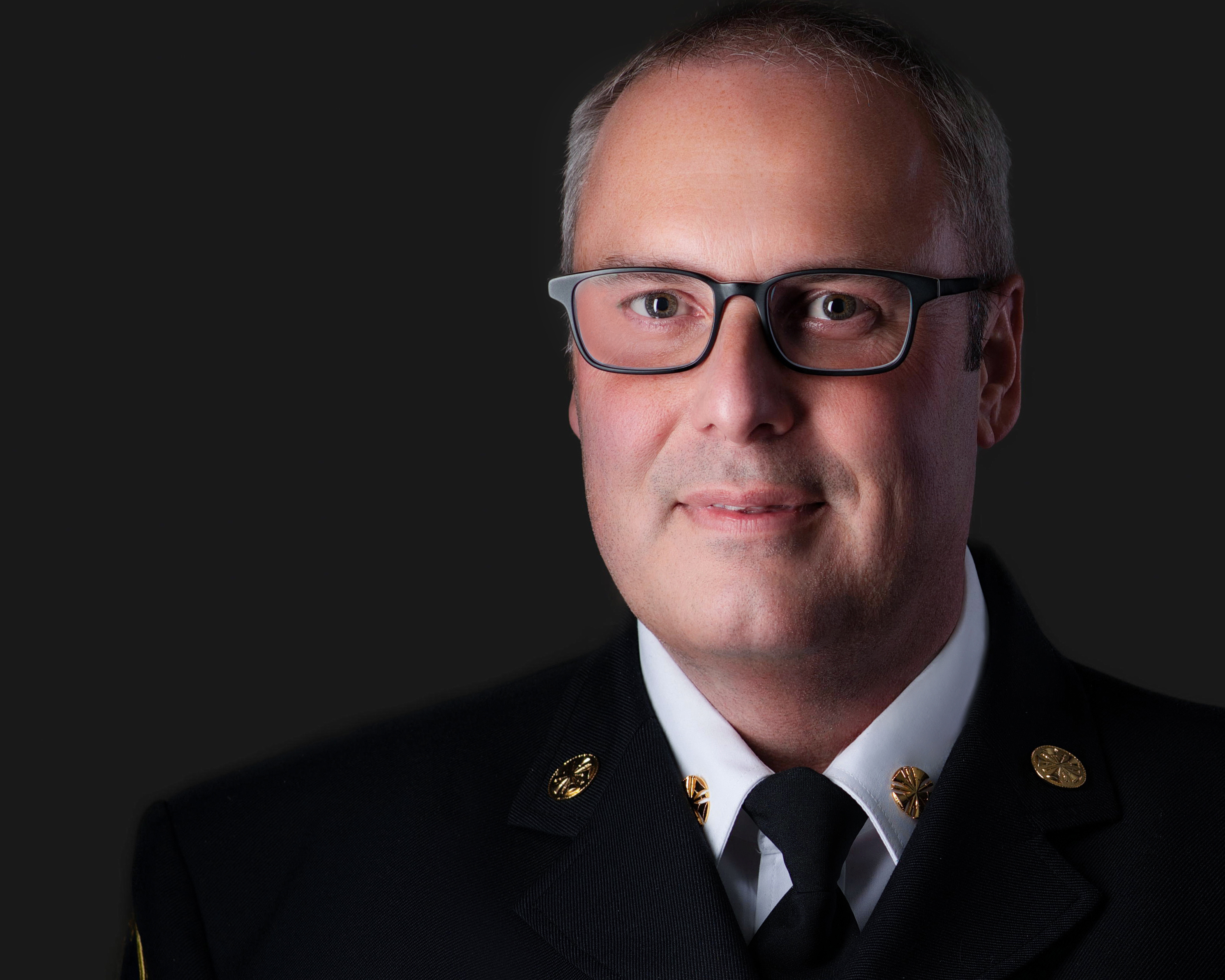 Jason Brolund is the Fire Chief for the City of West Kelowna and Westbank First Nation, in the Okanagan region of British Columbia. He led hundreds of firefighters during the devastating McDougall Creek Wildfire in August 2023, evacuating over 25,000 residents and saving thousands of homes. With 30 years of experience in emergency services, Brolund previously served as Deputy Fire Chief with the Kelowna Fire Department. He has been involved in managing major wildfires and floods in British Columbia and is passionate about wildfire prevention, serving on the board of the Fire Chiefs Association of British Columbia and FireSmart BC. Jason holds a Bachelor’s degree in Technology with a specialization in Emergency Management. He has received the British Columbia Provincial Fire Services Long Service Medal and the Canadian Fire Services Exemplary Services Medal. In 2022, he was named West Kelowna Citizen of the Year, and in 2024, he received the King Charles III Coronation Medal for his advocacy and community service. He gained national recognition for his transparent communication during daily briefings in the 2023 wildfire season, earning him the title of Kelowna's 2023 Newsmaker of the Year.
Jason Brolund is the Fire Chief for the City of West Kelowna and Westbank First Nation, in the Okanagan region of British Columbia. He led hundreds of firefighters during the devastating McDougall Creek Wildfire in August 2023, evacuating over 25,000 residents and saving thousands of homes. With 30 years of experience in emergency services, Brolund previously served as Deputy Fire Chief with the Kelowna Fire Department. He has been involved in managing major wildfires and floods in British Columbia and is passionate about wildfire prevention, serving on the board of the Fire Chiefs Association of British Columbia and FireSmart BC. Jason holds a Bachelor’s degree in Technology with a specialization in Emergency Management. He has received the British Columbia Provincial Fire Services Long Service Medal and the Canadian Fire Services Exemplary Services Medal. In 2022, he was named West Kelowna Citizen of the Year, and in 2024, he received the King Charles III Coronation Medal for his advocacy and community service. He gained national recognition for his transparent communication during daily briefings in the 2023 wildfire season, earning him the title of Kelowna's 2023 Newsmaker of the Year.
Ice Storm Lessons Learned Panel
In March, a sudden ice storm swept parts of Ontario, prompting several regions to declare states of emergency in response to widespread power outages, fallen trees and power lines, and treacherous road conditions. Join Fire Chief Mike Cavanagh of Peterborough Fire, Fire Chief Chris Ferry of Orillia Fire, Fire Chief Roree Payment of Oro-Medonte Fire, and Moderator Fire Chief Jeremy Parkin of Rama Fire as they share their fire department experiences and strategies for managing the aftermath of the storm.
Presenters:
Deputy Chief Mike Cavanagh, Peterborough Fire
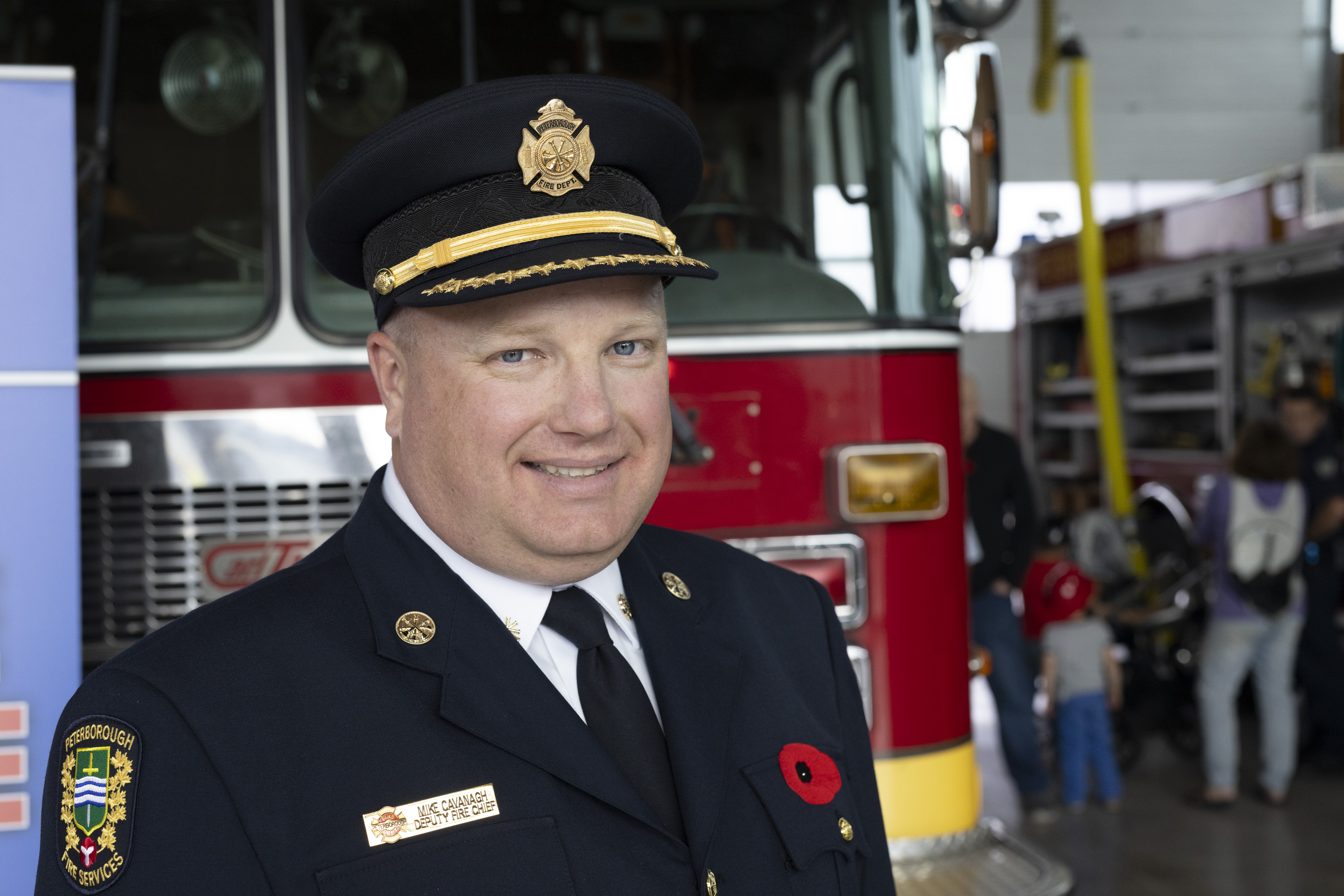 Mike Cavanagh is the Deputy Fire Chief for Peterborough Fire Services, with over 20 years of progressive leadership in fire service operations, emergency management, and public safety. Mike is recognized for his strategic leadership during critical incidents — most notably his role in coordinating the Fire Services response during the May 2025 ice storm.
Mike Cavanagh is the Deputy Fire Chief for Peterborough Fire Services, with over 20 years of progressive leadership in fire service operations, emergency management, and public safety. Mike is recognized for his strategic leadership during critical incidents — most notably his role in coordinating the Fire Services response during the May 2025 ice storm.
Fire Chief Chris Ferry, Orillia Fire
Fire Chief Chris Ferry has been the Fire Chief / CEMC for the City of Orillia since January 1, 2025. Chief Ferry has worked with and risen through the ranks of City of Orillia Fire Department since 2003. Chief Ferry has been a member of the Fire Services since 1997.
Chief Ferry leads a department consisting of 1 Deputy Chief, 4 full time and 5 part time Communicators, two Fire Prevention staff, 40 Career Fire Fighters, 30 Volunteer Fire Fighters, and two Administrative staff operating from two fire stations.
Chris is a certified NFPA 1021 Fire Officer Level IV and has a diploma in Fire Protection Engineering Technology and a certificate in Fire Service Executive Management. Chris and his wife Lisa were born and raised in Orillia and area and continue to live there with their daughter and son.
Fire Chief Roree Payment, Oro-Medonte Fire
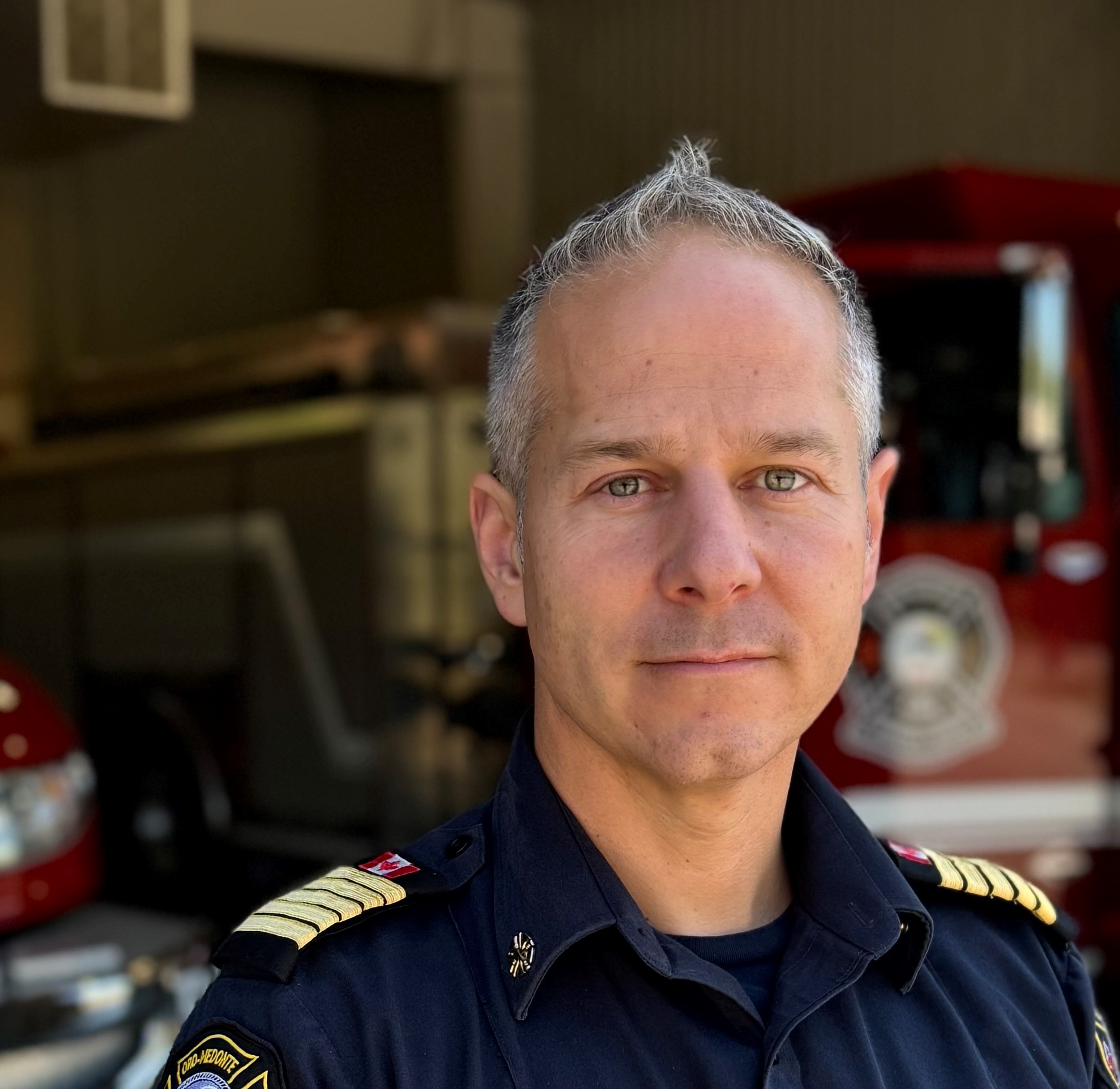 Fire Chief Roree Payment began his fire service career in 2000 and since then has worked in volunteer, composite and career departments around Simcoe County and York Region. He has been a Chief Officer since 2013, having served alongside countless outstanding individuals who have helped shape his career. He is a firm believer in doing the job right, creating a focus on the end user and delivering the best service possible. Since taking over the Chief role in Oro-Medonte in February 2025, he has focused on the strengths of the department and building on the incredible dedication and commitment of its members.
Fire Chief Roree Payment began his fire service career in 2000 and since then has worked in volunteer, composite and career departments around Simcoe County and York Region. He has been a Chief Officer since 2013, having served alongside countless outstanding individuals who have helped shape his career. He is a firm believer in doing the job right, creating a focus on the end user and delivering the best service possible. Since taking over the Chief role in Oro-Medonte in February 2025, he has focused on the strengths of the department and building on the incredible dedication and commitment of its members.
Moderator: Fire Chief Jeremy Parkin, Rama Fire
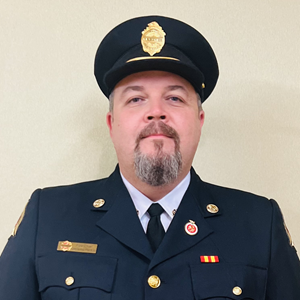 Jeremy Parkin is the Director of Emergency Services for Rama First Nation where he oversees the fire department, paramedic services and emergency management divisions. His 25-year career includes volunteer firefighter experience with several departments. Jeremy has been an active member in various local, provincial and federal boards and committees. And as the Vice President of the Ontario Association of Fire Chiefs he is a strong voice for public and firefighter safety. With a background in training and certification, he also focuses his attention to diversity, equity and inclusivity within the fire service. He is also the President of the National Indigenous Fire Safety Council and is heavily engaged in promoting fire safety in First Nation communities. He also has extensive work in emergency management programs and training.
Jeremy Parkin is the Director of Emergency Services for Rama First Nation where he oversees the fire department, paramedic services and emergency management divisions. His 25-year career includes volunteer firefighter experience with several departments. Jeremy has been an active member in various local, provincial and federal boards and committees. And as the Vice President of the Ontario Association of Fire Chiefs he is a strong voice for public and firefighter safety. With a background in training and certification, he also focuses his attention to diversity, equity and inclusivity within the fire service. He is also the President of the National Indigenous Fire Safety Council and is heavily engaged in promoting fire safety in First Nation communities. He also has extensive work in emergency management programs and training.
OAFC Business Meeting
The OAFC business meeting will include a robust OAFC update which will include a detailed government relations update and discussion, an update from the OAFC’s committees and working groups; and discussions regarding member services and OAFC events.
In addition, there will be the presentation of the 2026 budgets, a 2025 financial update, member resolutions, ratification of election results and an opportunity for roundtable discussion.
Immediately following the OAFC business meeting will be the presentation of the annual awards, followed by an awards reception sponsored by AJ Stone.
Presenters: OAFC Board of Directors
Suicide at the Station
First Responders’ suicide has emerged as one of the foremost challenges facing the Canadian public safety sector. For example, a study of fire service ideation of suicide in a partnership between NFFF and Florida State University found nearly half of 1,000 fire service respondents reported encountering suicidal thoughts at one or more points in their firefighting career, and another 15 percent reported one or more suicide attempts. North Bay Fire and Emergency Services, the Winnipeg Fire and Paramedic Services, and the Ontario Provincial Police have experienced tragedy in losing a first responder by suicide.
In a discussion moderated by Wounded Warriors Canada CEO Scott Maxwell, Fire Chief Jason Whiteley (North Bay, ON), Deputy Chief Scott Wilkinson (Winnipeg Fire and Paramedic Services), and Sarah Routhier (Widow of OPP Sergeant Sylvain Routhier) will speak to their lived experience and challenges of managing a response following a first responder death by suicide. This candid discussion will touch on departmental responses, social media, the impacts on survivors, tough discussions, peer support burnout, and the importance of self-care.
Presenters:
Scott Maxwell, Wounded Warriors Canada
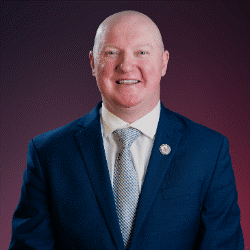 Scott is a dedicated public servant, mental health champion, and not-for-profit leader.
Scott is a dedicated public servant, mental health champion, and not-for-profit leader.
Scott’s unique experience intersects public policy, national and provincial government, and non-profit business strategy and development.
His passion for those who bravely serve Canada stems from his high school friend, Trooper Darryl Caswell, from Bowmanville who was killed by a roadside bomb in Afghanistan on June 11, 2007.
As CEO of Wounded Warriors Canada, the country’s largest non-profit mental health training and counselling provider for Veterans, First Responders and their families, Scott successfully transformed what was a local volunteer-based initiative into a national organization that provides support to over 30,000 trauma exposed professionals and their families each year.
Scott has been awarded the Minister of Veterans Affairs Commendation, the Queen’s Platinum Jubilee Medallion and the King’s Coronation Medal for Service to Canada.
Sarah Routhier-Clark, Sylvain Routhier Memorial Foundation
 Sarah is an author, a mental health advocate, and a busy mom. She is the widow of OPP Sergeant Sylvain Routhier, who passed away by suicide in July 2018. She is the Founder and President of the Sylvain Routhier Memorial Foundation and has been involved in many mental health initiatives. Sarah is honoured to be able to share her personal story, and her lessons learned so she can raise awareness about suicide and mental health illnesses in first responders. Her goal is to prevent this tragedy from occurring to other families and to make change within first responder organizations.
Sarah is an author, a mental health advocate, and a busy mom. She is the widow of OPP Sergeant Sylvain Routhier, who passed away by suicide in July 2018. She is the Founder and President of the Sylvain Routhier Memorial Foundation and has been involved in many mental health initiatives. Sarah is honoured to be able to share her personal story, and her lessons learned so she can raise awareness about suicide and mental health illnesses in first responders. Her goal is to prevent this tragedy from occurring to other families and to make change within first responder organizations.
Deputy Chief Scott Wilkinson, Winnipeg Fire Paramedic Service
 Scott Wilkinson is a 34-year veteran of the fire and paramedic service and currently serves as the Deputy Chief of Fire Rescue Operations & Training for the Winnipeg Fire Paramedic Service. Scott previously served as the Assistant Chief, Community Risk Reduction and prior to that as the Project Manager for Training and Safety Equipment. Scott is a Primary Care Paramedic and formerly managed the WFPS officer and chief officer development programs.
Scott Wilkinson is a 34-year veteran of the fire and paramedic service and currently serves as the Deputy Chief of Fire Rescue Operations & Training for the Winnipeg Fire Paramedic Service. Scott previously served as the Assistant Chief, Community Risk Reduction and prior to that as the Project Manager for Training and Safety Equipment. Scott is a Primary Care Paramedic and formerly managed the WFPS officer and chief officer development programs.
He is the former Peer Support Coordinator for the WFPS and continues to work with the department’s behavioural health and wellness programs.
Scott serves on the NFPA Fire Officer Professional Qualifications Technical Committee and is the developer of numerous departmental programs including RPAS and PPE Maintenance and co-developed the WFPS Diversity Equity Fire Training Program (DEFT).
He serves on various committees for the Canadian Association of Fire Chiefs (CAFC) including Human Factors, Leadership and Mental Health and is the chairperson of the RPAS/Robotics Committee. Scott holds the CAFC Executive Chief Fire Officer (ECFO) credential and a Bachelor’s degree from the University of Manitoba.
Fire Chief Jason Whiteley, North Bay Fire
 Jason Whiteley was appointed Fire Chief of North Bay Fire and Emergency Services in September of 2016, and has more than 36 years of fire service experience in the management of fire operations, including business administration, emergency management and response, fire prevention and education. Jason has many certifications and post-secondary education including Fire Protection Engineering, Ambulance and Emergency Care, Municipal Management diploma and Human Resource and Employment Law certificate, Alternative Dispute Resolution, Mental Health Leadership and political science.
Jason Whiteley was appointed Fire Chief of North Bay Fire and Emergency Services in September of 2016, and has more than 36 years of fire service experience in the management of fire operations, including business administration, emergency management and response, fire prevention and education. Jason has many certifications and post-secondary education including Fire Protection Engineering, Ambulance and Emergency Care, Municipal Management diploma and Human Resource and Employment Law certificate, Alternative Dispute Resolution, Mental Health Leadership and political science.
Jason is Director and former vice-president of the Ontario Association of Fire Chiefs. He is currently the chair of the National Advisory Council for the Canadian Association of Fire Chiefs and a board member. Jason has also represented the fire service on several provincial, national, and international committees and organizations.
Prior to being appointed Fire Chief for North Bay, Jason was the Deputy Fire Chief for the City of Woodstock and before that he was the Deputy Fire Chief of Norfolk County. Jason began his career as volunteer firefighter with the City of Burlington Fire Department; then spent 16 years with Mississauga Fire and Emergency Services with various roles and responsibilities before moving into the management ranks.
Jason has been a presenter at many conferences on firefighter safety in the areas of cancer prevention and mental health.
Tiered Response Deployment Decisions
Most Ontario fire departments respond to at least some medical calls through tiered response agreements, and in many cases these calls can be up to 50% of their total call volume. Making the decision on which tiered response medical calls to respond to, and when, is an important but complicated one. With Ontario’s ambulance dispatch centres transitioning to the Medical Priority Dispatch System (MPDS), which has 2,300 different call determinants, this decision making is even more challenging than before.
In an effort to determine which medical calls most warranted fire department response and firefighter intervention, Dr. Feldman analyzed over 150,000 medical calls over an 18 month period in Peel Region to determine which MPDS determinants were linked to high patient acuity, need for urgent medical interventions, and could likely benefit from firefighter first response. Using that information, Mississauga Fire Deputy Chief Rob Grimwood and Mississauga Fire & Emergency Services Medical Director Dr. Sheldon Cheskes reviewed the current firefighter patient care level of service, training, and medical directives to determine which medical calls firefighters should respond to.
This presentation will briefly review what the MPDS system is, present the findings of the research project, and provide an overview of how one fire department utilized the call information to make informed decisions regarding its level of service and tiered response deployment plans.
Presenters:
.jpg) Dr. Sheldon Cheskes
Dr. Sheldon Cheskes
Dr. Sheldon Cheskes is a Professor with the Division of Emergency Medicine, Department of Family and Community Medicine at the University of Toronto, a scientist at the Li Ka Shing Knowledge Institute at St. Michael’s Hospital and an affiliate scientist at Sunnybrook Research Institute. He is the Medical Director for the Regions of Halton and Peel with the Sunnybrook Centre for Prehospital Medicine. He is one of the principal investigators for the Canadian Resuscitation Outcomes Consortium (CanROC) and is a recognized international authority in the area of CPR quality and out-of-hospital cardiac arrest resuscitation. Dr. Cheskes has published over 175 manuscripts in high impact journals such as the New England Journal of Medicine, Circulation, CMAJ and Resuscitation that have changed resuscitation practice around the world.
He is the principal investigator of the DOuble Sequential External Defibrillation in Refractory Ventricular Fibrillation (DOSE VF) trial exploring alternate defibrillation strategies for refractory ventricular fibrillation during out-of-hospital cardiac arrest. He is also studying methods to improve public access defibrillation in rural and remote areas through the use of community responder programs and drone delivery of automated external defibrillators.
 Dr. Michael Feldman
Dr. Michael Feldman
Dr. Michael Feldman is an emergency physician at Sunnybrook Health Sciences Centre in Toronto and the Collingwood General & Marine Hospital, and an associate professor in the Department of Medicine at the University of Toronto. He worked for 12 years as a paramedic and ambulance dispatcher prior to completing an MD and PhD at Queen’s University in Kingston. He served as medical director for Toronto Fire Services from 2005 to 2017, as a transport physician for Ontario’s provincial air ambulance service from 2007 to 2017, and currently serves as medical director for four paramedic services in a large region north of Toronto, for 13 fire departments in Simcoe County, and as the medical director for ambulance dispatch for the Province of Ontario. He continues to work in a variety of non-conventional emergency care settings, including serving as medical director for paramedic chemical/biological/nuclear teams and tactical teams around the greater Toronto area, Canada Heavy Urban Search and Rescue Task Force 3 in Toronto, and as the team leader for Toronto’s site medical teams. His current research interests include assessment of dispatch protocols, assessment of accuracy of prehospital CTAS, and was a co-investigator in the recent trial of double-sequential defibrillation in out-of-hospital cardiac arrest.
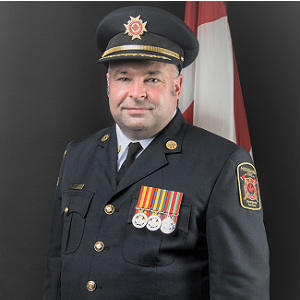 Deputy Chief Rob Grimwood
Deputy Chief Rob Grimwood
Rob Grimwood is a Deputy Chief with the City of Mississauga Fire and Emergency Services where he oversees the Professional Development & Accreditation and Communications Divisions, along with serving as the Management Co-Chair for the Joint Health & Safety Committee.
Formerly Rob was a Deputy Chief for the City of Vaughan Fire & Rescue Service and the Fire Chief in the City of Dryden, Town of Niagara-on-the-Lake, and Haldimand County. He has also served as a Firefighter with the City of Toronto.
He worked as a Paramedic for 20 years and spent nine years as the Paramedic Chief in Haldimand County.
He has been a member of the fire service for the past 29 years, the last 17 of which have been in various senior leadership positions. He is the President of the Ontario Association of Fire Chiefs (OAFC), Management Co-chair of the Ontario Fire Services Section 21 Committee and an instructor for Dalhousie University’s Fire Service Management Program.
Mandatory Certification - Options to help you plan for July 2026
With the first compliance deadline for mandatory certification coming up in July 2026, the Office of the Fire Marshal continues to support departments in achieving certification. This presentation will feature the OFMs Training and Certification Division who will provide you with a refresher on the many training models that exist, timelines for certification testing and provide an update on current training disciplines being developed. A great opportunity to ask questions and continue developing a plan for your department.
Presenters:
Melanie Arsenault, Manager, Academic Standards and Evaluation Unit
Deanna Kirwin, Manager, Academic Unit
Tara Lew, Manager, Development and Quality Assurance Unit


